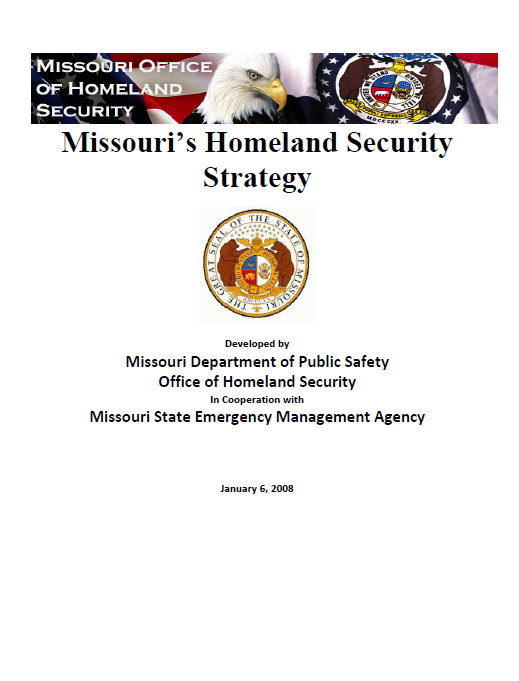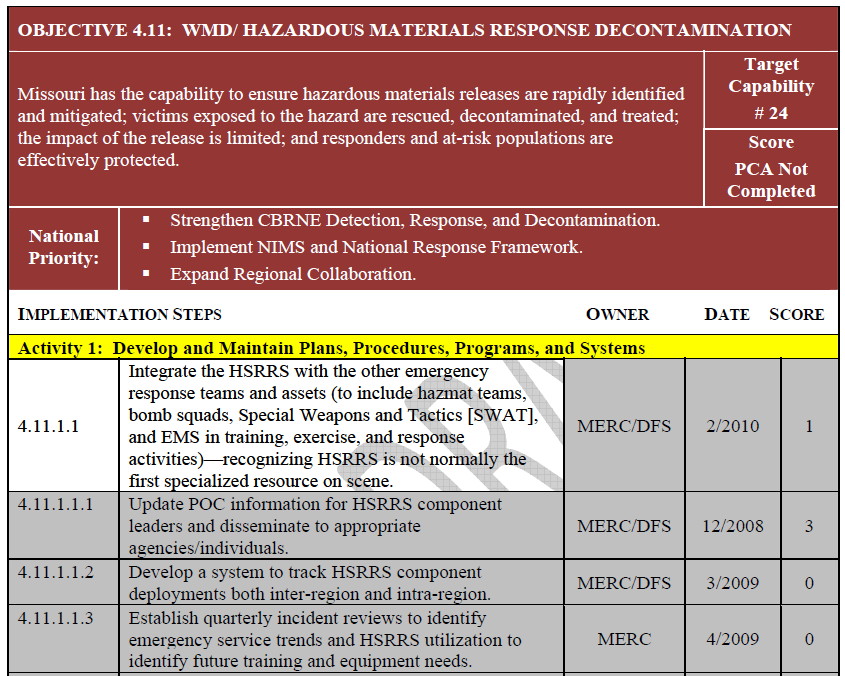 Missouri Department of Public Safety
Missouri Department of Public Safety
- Office of Homeland Security
- 108 pages
- State Homeland Security Sensitive
- For Official Use Only
- January 6, 2008
This State Homeland Security Strategy (Strategy) was developed to provide overarching guidance to the State’s Homeland Security programs and initiatives, to include guidance in support of the homeland security governance provided through the Governor’s Homeland Security Advisory Council (HSAC) and nine Regional Homeland Security Oversight Committees (RHSOC). This Strategy will help prepare our State for the work ahead in several ways. It provides direction to state government agencies, departments, and offices on activities Missouri plans to undertake in order to sustain existing capabilities in four U.S. Department of Homeland Security mission areas (prevention, protection, response, and recovery) and enhance the emergency preparedness posture statewide between 2009 and 2011. Missouri’s Department
of Public Safety (DPS), specifically the Office of Homeland Security (OHS) and State Emergency Management Agency (SEMA), will use the Strategy as a mechanism to track progress in implementing and completing security-related projects.As other priorities at the local, state, and national level emerge that will compete for funding and resources, the strategy will server as a “road map” to help state and local officials establish priorities at all levels and find the proper balance between the competing priorities. The Strategy will also be released to Missouri’s Urban Area Security Initiative (UASI) areas of Kansas City and St. Louis, to continue synchronizing activities inclusive of the whole state. The Strategy will be adjusted and amended over time. We must be prepared to adapt to the ever changing threat spectrum, economic climate, and political agendas, yet ensure consistency in our strategy, so that Missouri citizens are well served by their homeland security program.
Starting in 2006, Missouri adopted an all-hazard, capability-based approach to homeland security planning to: 1) better assess preparedness; 2) enhance development of preparedness strategies; 3) prioritize use of limited resources; and 4) otherwise guide and measurably improve preparedness planning. The State has adopted an annual, capability-based planning cycle that fosters continuous improvement. This cycle will help with coordination and collaboration efforts to streamline emergency preparedness activities across all levels of government and geographic areas, and to develop a consistent and systematic approach to investing resources. Current improvements have resulted from enhanced training programs, identification of technology development priorities, and performance evaluations during exercises and real incidents. This Strategy—based on the 37 Target Capabilities identified by the United States Department of Homeland Security (DHS)—promises to extend improvements.
While aligned with the DHS Strategic Plan, this Strategy recognizes Missouri’s expanded all-hazard viewof homeland security. The Strategy recognizes that homeland security embraces more than just the threat to our security from terrorist attack. It also recognizes that while government cannot possibly deter or prevent most natural occurring disasters and diseases, and much traditional criminal activity, an aggressive and unified preparedness program allied with vigilance of state, county, and local governments can address the broader threat spectrum Missouri encounters. To achieve its mission, the State of Missouri, through a comprehensive state-wide emergency program, will effectively prepare for, prevent, protect, respond to, and recover from all hazards—including threats identified in the National Planning Scenarios. The State will plan, organize, train, equip, and exercise its resources in a focused effort to sustain its existing capacity, and build additional capabilities required to meet National Preparedness Guidelines and ultimately protect lives and property of Missouri citizens.
…

